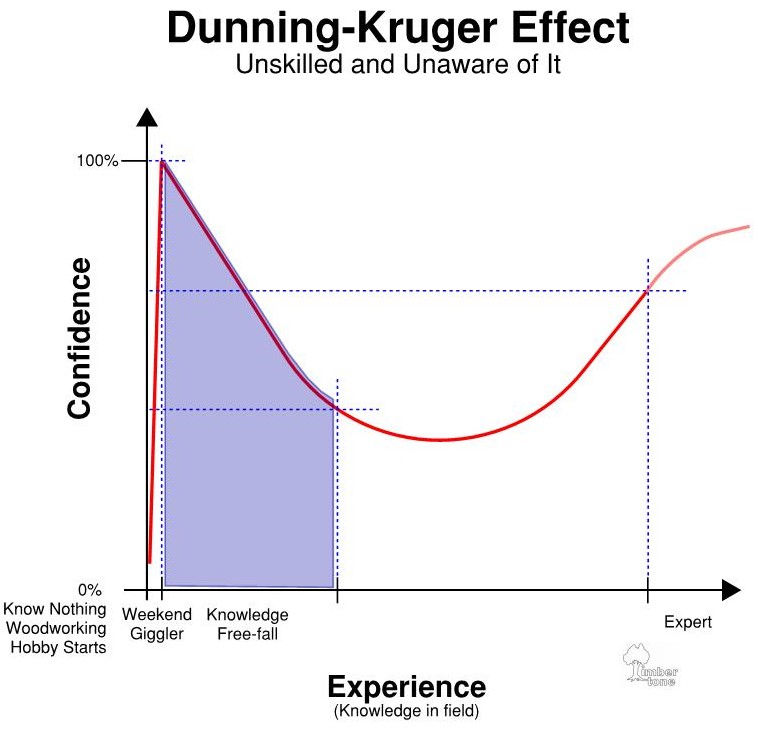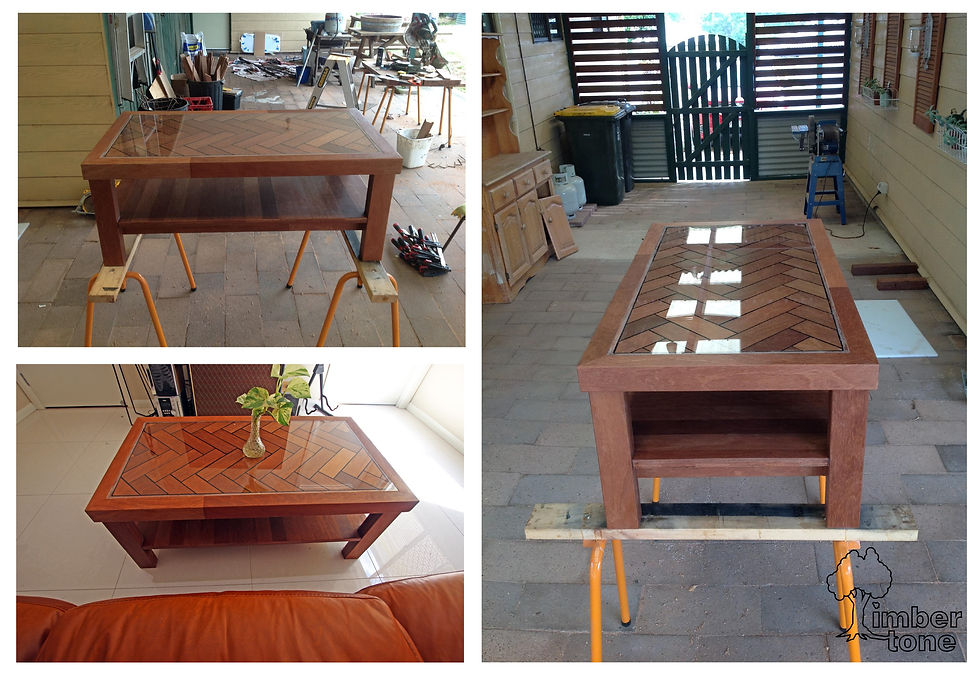To be honest, I started woodworking purely on a whim.
It was October 2009 and I had just signed the mortgage paperwork to purchase the home I still live in today. I clearly remember thinking "Well, there goes all my spare cash for a while; better get myself a low-cost hobby. Woodworking seems nice." So I drove to the local hardware and bought myself a plunge router, random orbit sander and a jigsaw; because those were 'woodworking tools'.
I started with the grandiose intention of making fine furniture for my new house.
There is a psychological concept known as the Dunning-Kruger effect. It is a cognitive bias where people with low ability at a task have a tendency to overestimate their proficiency of this task.

At this point, I was very much wet behind the ears, but already had reasonable hand skills from my trade training. I felt that with just a little practice, research and diligence, I'd master the craft in no time. Well, as they say 'hindsight is always 20/20'. It was pretty clear that my initial confidence of producing fine furniture straight out of the gates was somewhat optimistic. With some humility, I must admit, I was firmly within the ‘unconscious incompetence’ area of my newly chosen field. An expertise level we shall affectionately dub; the Weekend Giggler.

I did start off small, completing simple items with the limited tools and materials at my disposal; and to be fair, I did understand that practice was required to increase my proficiency. I tried adding a new level of complexity for each successive project to gradually increase my skillset. There were successes and failures during this period but I was quite enjoying woodworking so I started to accumulate more hand and power tools. With each successful project, my confidence increased markedly. In those earlier days it always seemed like the top was only one more project away.
While I had expanded my tooling, practical experience and basic skills noticeably; I still really lacked a solid comprehension of the actual processes for creating a furniture piece. My rudimentary understanding of this at the time still boiled down to;

Easy!
Although that process is objectively accurate in an abstract sense; it really fails to convey the depth and complexity of what 'woodworking' is or can be. To really grasp how these processes worked at the granular level, I needed more practical experience. So, I resolved to take on a project of larger scale because ultimately, to get better at something there really is no option but to push your own boundaries.
Being quite young at this point (early twenties) I decided that building a bar inside my house was a good idea. It involved some joinery, inlay and in-situ installation work; all of which I hadn’t previously attempted. I wasn’t totally shooting from the hip on this project though. I spent quite a bit of time drafting construction drawings and inlay templates. Once I had these compiled, I felt confident enough to buy the materials and get cutting. And this my friends, is where the decent from Weekend Giggler on the Knowledge Freefall began; transitioning from ‘unconscious incompetence’ to ‘conscious incompetence’;

I really cut my teeth on that project and still look back on it fondly; probably with rose-coloured glasses. Truly comprehending the breadth of how little you understand and what you can practically achieve, can get a bit deflating. It was definitely a trying experience but frustration breeds perseverance when you’re motivated. I didn’t have a bench so had to work off the ground, saw horses or on the edge of a trailer. I didn’t have a fully enclosed area for working in and all of my tools were stored on a picnic table. Despite this, I pushed on and completed the project over several months. Warts and all, I was happy with my efforts and proud of the outcome.

Pretty big Metallica fan in case you missed it there.
A whole new world of understanding lay before me and I was more eager than ever to further hone my skills. I started funnelling more money into woodworking to get more high-quality hand tools and serious machinery. My initial notion of woodworking being a ‘cheap’ hobby, was evaporating faster than my disposable income. It seemed like each new process or technique I wanted to implement, had its own set of specialised tools and equipment. Regardless, I ploughed on and decided to make a coffee table solely from some scrap plywood I got from my (now) brother in law.
For this I wanted to focus a little more on interesting design, incorporating a different material and machining precision. I decided to make a herringbone patterned table with an inlayed poly-carbonate top; all told 95% of the finished piece was made from the ply pieces joined & fitted. Again, I was happy & proud of outcome. I gifted it back to my sister & brother in law.

Also pictured; my 'workshop'.
Between these two projects quite a few ‘learning experiences’ (read: mistakes) were ingrained in the finished product. While it never feels good to make a mistake it’s important to understand and even embrace them so that they are learnt from and not repeated. Mistakes on any project are almost a given; foreseeing and/or dealing with them is what is important. Missing errors and allowing them to compound can make the difference between something salvageable and a failure destined for the fire pit.
During this period of my development I attempted several projects that I class as failures. I think it’s important to acknowledge failures as a point of inflection and growth. Trying to work on something that keeps getting worse is pretty grinding and disheartening; especially when you’re just one bloke who doesn’t know what he’s doing. I actually wanted to spend a bit of time talking about failure in this post but it turns out I had quite a bit to say so have decided to save that for a future edition. Suffice to say, that trying to flog a dead horse goes nowhere and sometimes it is more beneficial to simply accept defeat and move onto something productive.
Despite my repertoire of failures, I still was hurtling down the Knowledge free-fall at a blistering pace. I took on more projects and began to recognize my skills noticeably advancing. I also really felt I was gaining a deeper understanding of timber as a material. The full scope of the woodworking field was becoming more apparent to me and I began to understand how I wanted to work within it. Over time, I was beginning to feel more comfortable with the skills I was developing and mistakes were no longer completely unforeseen. It is at this point I would say I had crossed the threshold into ‘conscious competence’; an Enthusiastic Amateur.

Honestly, if you’ve kept on with a hobby to get this far; you are brimming with enthusiasm and motivation. The plummeting feeling of continually being on the back foot gives way to a gentle rise of realisation. Surpassing the confidence sapping free-fall is a good feeling. There are still many lessons to be learnt but they now provide deeper context for previous mistakes and create insight into aspects that you now consciously recognise are unknown.
Stepping onto the front foot I began thinking that formally sharing my works would further assist my development. I am a quiet and introspective person by nature and am deeply inquisitive and curious on many subjects. One thing that drives me is ongoing personal development. I have found that furthering oneself in any particular field can translate across to other aspects of your life and your existence as a person. While it is daunting to put oneself out there, I decided that this was the next step. I started with simple posts of captioned pictures on social media. I liked these, but ultimately, they were a little primitive and I wanted to step up my creativity.
My wife & I had bought a reasonable camera for an overseas trip so once we got back, I decided ‘why not give video making a crack?’. I picked something fairly simple to make but I’ll give you the hot tip; wasn’t that first video a hard and fast re-education in the Dunning-Kruger effect. You just don’t know what you don’t know.
Working with unfamiliar technology (Language Warning)
Having a vision for how something should look and translating that into reality on an unfamiliar software package while learning from scratch was challenging. I think my first videos still hold up OK, but back end, they were stitched together by band-aids and frustration. It’s always good to keep challenging yourself. It’s a good way to keep yourself grounded and ever curious.
Before writing this, I mulled over different ways to kick-off this blog but nothing really stuck. So, in the absence of anything else, I decided to just start at the beginning. Hopefully by reading this far, my experiences have resonated with you on some level. I think we can all relate to the insights & frustrations, the ups & downs; the real ebb & flow of emotions and understanding that taking on a new skill presents. Woodworking skill wise, I’d still put myself in the enthusiastic amateur bracket. As a video maker I’m still hurtling down the knowledge free-fall. So being the curious and inquisitive glutton for punishment that I am; I’m trying my hand at blogging as well; onwards and upwards!

Thanks for Reading. See you later.
Kind Regards
Walker
Weekend Giggler
N.B. – I’m not a psychologist, clearly, just trying to have a bit of fun with a clever and reflective concept that has won an Ig Nobel Prize.
If you liked this article why not stay up to date with all the latest from Timber Tone. Click here to subscribe so you never miss a post or video.

Comments